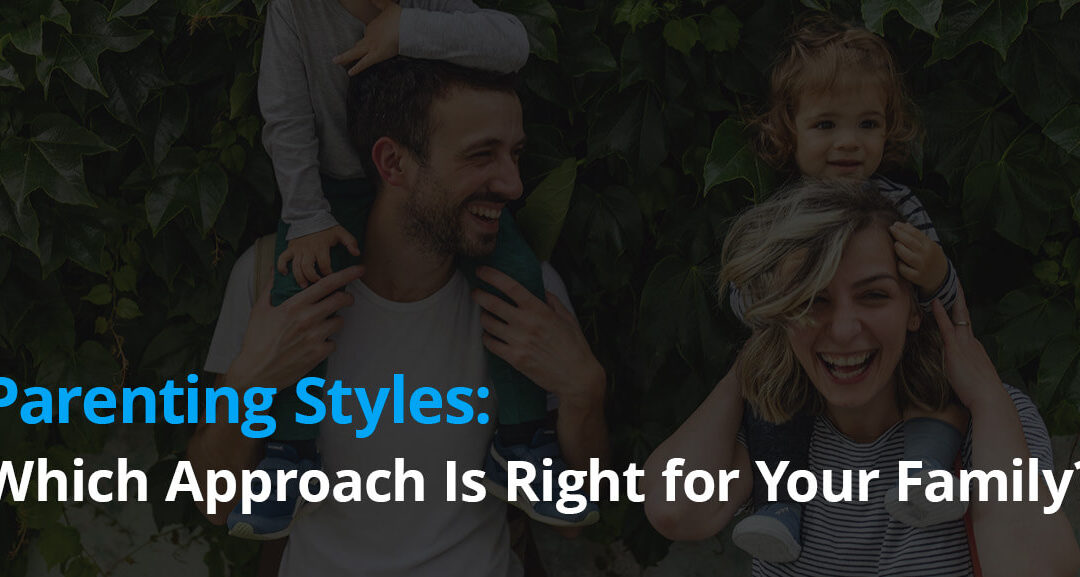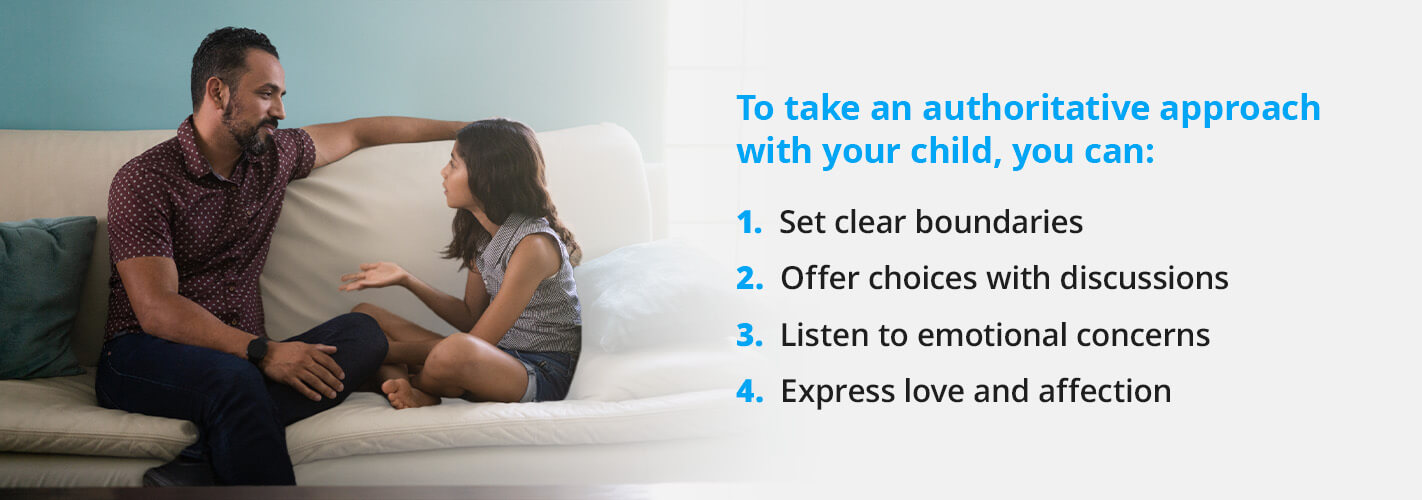What Are the 4 Main Parenting Styles?
Three different types of parenting styles — authoritative, authoritarian, and permissive — were identified by psychologist Diana Baumrind in the 1960s, while a fourth — neglectful — was introduced by Stanford researchers John Martin and Eleanor Maccoby in the 80s. Using naturalistic observation, parental interviews, and other research methods, these researchers found differences in disciplinary strategies, communication styles, warmth and nurturing, and expectations of maturity and control that suggest parents use one of the four types.
The four types of parenting psychology, characteristics, and examples include:
Authoritarian Parenting
Authoritarian parenting involves setting strict rules and high standards for children. In this kind of household, rules are strict, without room for interpretation, compromise, or discussion.
Children of authoritarian parents are generally good at following directions and behave well. However, they may grow up with a fear of punishment and lack the experience needed to make decisions. Some can become aggressively rebellious, have trouble navigating social situations, and struggle to make decisions.
Characteristics of this parenting style include:
- Having high demands without being responsive to the child.
- Expecting children not to make errors while providing little direction on what they should do or avoid in the future.
- Punishing children for mistakes without explaining why.
Examples of authoritarian parenting can include making a child eat everything off their plate and punishing them for not doing so. These parents would also be less likely to explain why the child must eat certain foods or how they impact the child’s health.
Authoritative Parenting
Authoritative parents set standards and monitor their child’s behavior while being supportive rather than restrictive. These parents provide frequent explanations and keep expectations realistic, giving their children the information and space needed to learn independent decision-making skills.
Other characteristics of authoritative parenting include:
- Being responsive to children and willing to listen to questions.
- Expecting a lot from children while providing warmth, feedback, and adequate support.
- Being more nurturing and forgiving and less punishing when children fail to meet expectations.
While caring, authoritative parents do not protect their children from their own mistakes, allowing them to experience mistakes naturally and learn from them. Examples of authoritative parenting include establishing chores while giving the child choices in the tasks they want to be responsible for.
Children of authoritative parents tend to be happy, capable, and successful. However, these parents may have difficulty raising children who undergo normal phases of rebellion, anger, and apathy since they are focused on raising their kids the best way possible.
Permissive Parenting
Permissive parents, also called indulgent parents, make few demands of their children and rarely discipline them. They also tend to be more nurturing and communicative, taking the status of a friend more than a parent.
Other characteristics of permissive parenting include:
- Being warm and attentive yet setting few rules or rarely enforcing them.
- Having very few expectations of children.
- Allowing the child to make their own decisions.
- Being actively involved in their child’s emotional well-being.
Permissive parents are responsive to their children but not demanding. Since they have few expectations, these kids can struggle to set limits for themselves and have poor self-regulation. Their parents may let them make their own decisions, but they will also bail them out when things don’t go well. As a result, the child may enter adulthood unprepared.
Examples of permissive parenting can include letting a child make decisions on what to eat, when to go to bed, and whether to do their homework.
Neglectful Parenting
In addition to the three styles introduced by Baumrind, psychologists John Martin and Eleanor Maccoby proposed the neglectful parenting style, which is almost always harmful. This parenting type is characterized by few demands, low responsiveness, and very little communication. In some cases, neglectful parents might reject or ignore their child’s needs. Other characteristics include:
- Fulfilling a child’s basic needs while being detached from their life.
- Not providing guidance, structure, rules, or even support.
- Being indifferent, unresponsive, and dismissive.
As a result of this parenting style, children may grow up self-sufficient and resilient out of necessity. They may experience depression and anxiety, have poor social relationships, and have trouble in school. Neglectful parenting may not always be a conscious decision by the parent and may be forced by specific circumstances like single parenting, needing to work longer shifts, or mental health issues.
An example of a neglectful parenting style can involve not buying groceries or planning consistent meals for a child. This can leave the child concerned about when they will eat next, and they may overeat when food is available.
How Do Parenting Styles Affect Child Development?
Research shows that parenting styles can have various impacts on children. Common areas of a child’s life that can be affected include:
- Academics: Parenting styles can play a role in motivation and academic achievement. This can later impact career decisions.
- Mental health: Parenting styles can influence a child’s mental well-being, with children raised by authoritarian, permissive or neglectful parents experiencing more anxiety, depression and other mental health issues.
- Social relationships: Parenting styles can impact how kids relate to other people. For instance, kids raised by permissive parents can experience more bullying, while kids raised by authoritarian parents may be more likely to bully others.
- Self-esteem: Kids raised by parents with permissive and authoritative styles tend to have stronger self-esteem than kids raised by parents with other styles.
What Is the Best Parenting Style?
While there’s no parenting style guaranteed to produce perfectly adjusted children, authoritative is often most recommended due to its ideal balance of control and autonomy. To take an authoritative approach with your child, you can:
- Set clear boundaries and communicate them to your child.
- Offer choices while having discussions about what is appropriate.
- Listen to and explore your child’s emotional health concerns.
- Frequently express love and affection.
You can also adjust your style to help a child through behavioral issues. Experts recommend thinking back to your childhood to determine what worked for you and what didn’t. If you need additional support, a mental health professional can offer guidance in parenting styles, help you determine your parenting style, and offer tips to create healthier family dynamics.
Contact Merrimack Valley Psychological Associates for Parenting Guidance
It can be challenging to choose the right parenting style for your child. Are you curious about our counseling approach? Find the answers you’re looking for on our Frequently Asked Questions page.
Most experts advise implementing an authoritative style and observing how your child responds. If you need additional support or have a child struggling with behavioral issues, Merrimack Valley Psychological Associates can help.
Our mental health professionals can provide guidance when parenting, including identifying your child’s traits and specific developmental needs. We can help you choose the right parenting style to maximize your child’s unique potential. To learn more about our services, contact us today.



